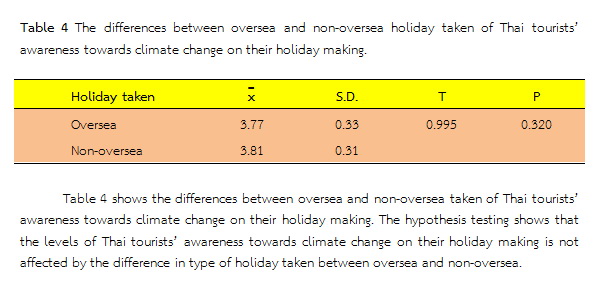THAI TOURISTS’ AWARNESS TOWARDS CLIMATE CHANGE ON HOLIDAY MAKING
Main Article Content
Abstract
Purpose This study aimed to explore Thai tourists’ awareness towards climate change on their holiday making.
Methods This study was a quantitative research adopting questionnaires as a main method of data collection. This research adopted a convenience sampling method by handing a questionnaire that was provided to 400 potential Thai tourists, aged between 18 to 55 years old. This was a survey research using the closed-end questionnaire as a research tool. The pilot test was taken place with 30 respondents in order to do the reliability test by using the analyst of Cornbach's Alpha Coefficient (0.93).The statistical data analysis in this study used frequency, percentage, mean, standard deviation and t-test with the statistical significance at 0.05.
Results Most of the respondents were females, aged between 25 to 34, had children in their household, working full-time, and graduated from higher education. Most of them have ever taken oversea holidays and using car as their mode of transportation. The respondents, overall, were aware ( = 3.79, S.D. = 0.51) that there were problems towards climate change. The hypothesis testing showed that the levels of Thai tourists’ awareness towards climate change on their holiday making were not affected by the difference in type of holiday taken between oversea and non-oversea.
Conclusion There were no differences between oversea and non-oversea holiday taken of Thai tourists’ awareness towards climate change on their holiday making. The attitude and behaviour correlations were found when actual behaviours were assessed that when self-report measurement was used. The difference between awareness and non-awareness was a matter of the strength of the attitude held, not a contrast in fundamental values.
Article Details
References
Agnew, M.D. & Viner, D. (2001). Potential impacts of climate change on international tourism. International Journal of Tourism and Hospitality Research, 3(1), 37-60.
Barr, S., Shaw, G., Coles, T. & Prillwitz, J. (2010). A holiday is a holiday: Practicing sustainability, home and away. Journal of Transport Geography, 18(3), 474-481.
Becken, S. & Hay, J. (2007). Tourism and climate change. Clevedon: Channel View Publications.
Becken, S. (2002). Analysing international tourist flows to estimate energy use associated with air travel. Journal of Sustainable Tourism, 10(2), 114-131.
Becken, S. (2007). Tourists' perception of international air travel's impact on the global climate and potential climate change policies, Journal of Sustainable Tourism, 15(4), 351-368.
Bickerstaff, K., Lorenzoni, I., Pidgeon, N. F., Poortinga, W. & Simmons, P. (2008). Reframing nuclear power in the UK energy debate: nuclear power, climate change mitigation and radioactive waste. Public Understanding of Science, 17(2), 145-169.
Boyatzis, R.E. (1998). Transforming qualitative information: thematic analysis and code development. Thousand Oaks: Sage.
Bryman, A. (2012). Social research methods. Oxford: Oxford University Press.
De Freitas, C.R. (2005). The climate-tourism relationship and its relevance to climate change impact assessment. Tourism, Recreation and Climate Change, 22, 29-43.
Fennell, D. A. & Dowling, R. K. (2003). Ecotourism Policy and Planning. Oxon: CABI Publishing.
Gordon, W. & Langmaid, R. (1990). Qualitative Market Research: A Practitioner’s and Buyer’s Guide. Aldershot: Gower.
Gössling, S. & Hall, C. M. (2005). Tourism and global environmental change: Ecological, social, economic and political interrelationships (Vol. 4). London: Taylor & Francis.
Gössling, S. & Hall, C. M. (2006). Uncertainties in predicting tourist flows under scenarios of climate change. Climatic Change, 79(3-4), 163-173.
Gössling, S. & Hall, C.M. (2008). Swedish tourism and climate change mitigation: An emerging conflict?. Scandinavian. Journal of Hospitality and Tourism, 8(2), 141-158.
Gössling, S., Bredberg, M., Randow, A., Sandström, E. & Svensson, P. (2006). Tourist perceptions of climate change: a study of international tourists in Zanzibar. Current Issues in Tourism, 9(4&5), 419-435.
Holden, A. (2000). Environment and tourism. London: Routledge.
Lorenzoni, I. & Pidgeon, N. F. (2006). Public views on climate change: European and USA perspectives. Climatic Change, 77(1-2), 73-95.
Mason, P. (2003). Tourism impacts, planning and management. Oxford: Butterworth Heinemann.
Mathieson, A. & Wall, G. (2006). Tourism: Changes, impacts and opportunities. Harlow: Pearson Prentice Hall.
McKercher, B. (1993). The unrecognized threat to tourism. Can tourism survive sustainability? Tourism Management, 14(2), 131-136.
Monbiot, G. (2007). Heat: How to Stop the Planet from Burning. Cambridge: South End.
Norcia, V.D. (2008). Global warming is man-made: Key points in the international panel on climate change 2007 report. Oxford: University of Sudbury Emeritus Professor of Philosophy.
Peterson, K.I. (2007). Qualitative research methods for the travel and tourism industry. In: Ritchie, J. R. B. and Goeldner, C. R. (eds.). Travel, tourism, and hospitality research: A handbook for managers and researchers. (2nd ed) Madison: John Wiley & Sons, Inc.
Richardson, R. B. & Loomis, J. B. (2005). Climate change and recreation benefits in an alpine national park. Journal of Leisure Research, 37(3), 307.
Schlegelmilch, B.B., Bohlen, G.M. & Diamantopoulos, A. (1996). The link between green purchasing decisions and measures of environmental conscious. European Journal of Marketing, 30(5), 35-55.
Scott, D. (2011). Why sustainable tourism must address climate change. Journal of Sustainable Tourism, 19(1), 17-34.
Scott, D., Hall, C. M. & Gössling, S. (2012). Tourism and climate change: Impacts, adaptation and mitigation (Vol. 10). Oxford: Routledge.
Scott, D., Wall, G. & McBoyle, G. (2005). The evolution of the climate change issue in the tourism sector. Tourism, Recreation and Climate Change, 44-60.
Shah, A. (2009). Climate change and global warming introduction. Retrieved from: https://www.globalissues.org/article/233/climate-change-and-global-warming-introduction.
Shaw, S. & Thomas, C. (2006). Discussion note: social and cultural dimensions of air travel demand: hyper-mobility in the UK? Journal of Sustainable Tourism, 14(2), 209–215
Tourism Alliance. (2016). UK tourist information. Retrieved from: https://www.tourismalliance.com/.
Tourism Authority of Thailand. (2015). Thai travel statistics. (accessed 17.07.2016)
UNWTO. (2017). Tourism highlights 2017 edition. United Nations World Tourism Organization: United Nations.
Vining, J. & Ebreo, A. Z. (1992). Predicting recycling behaviour from global and specific environmental attitudes and changes in recycling opportunities. Journal of Applied Social Psychology, 22, 1580-1607.
Yamane, T. (1973). Statistics: An introduction analysis. New York: Harper & Row.
Yin, R. (1993). Application of case study research. Riverside: Sage Publication.


